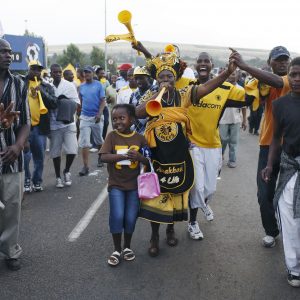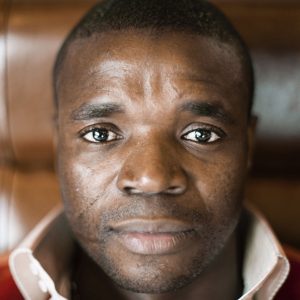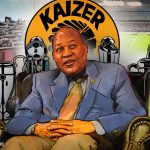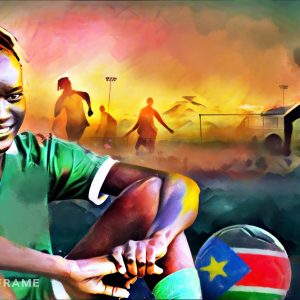Is a peaceful Soweto Derby such a bad thing?
Those who experienced the fan violence in decades past applaud the derby’s peaceful nature now, but critics say the spark is gone and teaming up to secure sponsorship has diluted the rivalry.
Author:
20 March 2021

This is not how it is supposed to be. A milestone as significant as the country’s two biggest football teams clashing for the 100th league match should be celebrated to the fullest by the football fraternity.
But such are the Covid-19 times we live in that when Kaizer Chiefs and Orlando Pirates lock horns on this momentous occasion – on Human Rights Day, 21 March – the giants of South African football will do so in an empty stadium.
No one could have imagined a Soweto Derby with no supporters in 1970, when the teams first met following Kaizer Motaung’s petulant departure from Pirates in protest after the Buccaneers suspended three of his teammates for having gone to play in Botswana.
That move birthed the greatest rivalry in the local game. A rivalry that almost always saw the stadium – initially Orlando, then Ellis Park and later the FNB – packed to capacity with passionate fans who hated the opposition’s guts.
Related article:
So intense was the adversarial relationship that many lives were lost over the years as fans of the two clubs did not take kindly to their clubs losing. As he anticipated Sunday’s centennial league match, renowned Amakhosi fan Saddam Maake could not help but share his pride at having played a crucial role in ensuring the Soweto Derby is arguably the most unique such match the world over.
Nowhere else around the globe would you find the fans of two rival clubs sitting together in the stands and enjoying the match as Chiefs and Pirates fans do now.
“I know it is strange to most people because they feel that’s not a real derby,” Maake says “But knowing where we come from, this evolution is one of the best things that could have ever happened to South African football.”

Fights and hooligans
Maake is a former Moroka Swallows fan who took an immediate liking to Kaizer XI, before they officially became Kaizer Chiefs in 1970. He still has vivid memories of having to run out of the old Orlando Stadium wearing only one shoe to avoid being attacked by angry Pirates hooligans after a Chiefs victory.
“I remember once, in the Stylo Cup at Orlando Stadium in the early 1980s, Chiefs beat Pirates 3-2 in the final. When we were going out of the stadium, the Pirates guys were forcing Chiefs fans to do the crossbones and skull insignia. If you didn’t, you got beaten up badly. It was rough. But I loved Chiefs so much, I was not prepared to do that Pirates sign. So, I jumped over the gate and ran away to avoid lifting my arms up like a Pirates fan. They chased me and I ran so fast I even dropped my shoe. I ran all the way home to Alexandra.”
The battles did not end at the stadiums. Many Chiefs and Pirates fans in different places around the country got into physical fights over the results, fights that sometimes turned deadly.
Related article:
Maake recalled the bloody fights that erupted after the 1984 Mainstay Cup final that Chiefs won via a Teenage Dladla penalty, as well as in 1987 when Amakhosi reigned supreme in a match.
“I am sure many will also remember that incident in 1994, when the Pirates fans broke off the seats of the FNB Stadium and burnt some of them. It was just bad sportsmanship.”
Before that sore sight though, Maake had worked towards changing the status quo of the country’s biggest match.

“After many years of experiencing the fights between the two sets of fans, in the stadiums and in different townships the country over, we felt enough was enough. Together with Louis Tshakoane [the flamboyant former Chiefs public relations officer] and David Thidiela [the Black Leopards boss who was then the league’s head of security], we agreed that things had to change. This was in 1991 and I remember meeting up with the late Mzion [Mofokeng, a top Pirates fan] and other fans from both sides and agreeing that we had to start behaving differently.
“For one derby match, we exchanged makarapas,” he said, referring to the hard hats painted in club colours and often decorated with the team’s insignia. “And moved around in the stands in a show of unity to the other fans.
“Others didn’t take kindly to this move and I remember one angry Pirates fan spilling his beer on me. But we were determined to show them that we could enjoy a game together. Our message was that we can be rivals for the 90 minutes when the match is on, but we shouldn’t kill each other because of the results.”
The peacemaker
Over time, Maake says, many of the two clubs’ fans bought into the idea and soon there were no longer dedicated Chiefs and Pirates sections in the stands. For his efforts, the Greater Sebokeng Pirates’ branch awarded the passionate Chiefs fan – who says he has only ever missed two of the 173 derbies ever played, and only because of Covid-19 – a certificate in 2004 in recognition of his “selfless effort in building bridges and brotherhood amongst supporters” of the Soweto giants.
Pirates chairperson Irvin Khoza has spoken previously of his delight at this change and about how the two, as clubs, agreed to come together pre-1994 to help ease tensions between the warring political factions in KwaZulu-Natal.
Related article:
Granted, there have been many players who have worn the colours of both clubs over the years. But there was a time when the rivalry was so intense that it was unheard of for a player to move directly from one side to the other. Such a transfer would probably have led to bloodshed.
Marks Maponyane expressed delight that those times are long gone. “For me, there were some elements of hooliganism and barbarism to the whole situation, and I am glad we’ve all become civilised to understand that this is just a game and that it is business,” said the renowned football commentator who starred for both Chiefs and Pirates in the 1980s and 1990s.
“I mean, who would want to hear the news that a family member of theirs was killed in a fight over a football match or at the stadium? Those were the crazy times and thank God they are over. What is happening with the derby now is great. I know some people feel that the rivalry is no longer as intense, but I disagree because I know that the two clubs always give their best whenever they face each other. The match is still as hard-fought as ever.”
What about the fact that he could not move directly from Chiefs to Pirates though?
“That was how it was at the time. I had to go to Dynamos for a year before going to Pirates, because maybe it wouldn’t have been nice for some people. But I remember that while there were some Chiefs fans who did not like it when I joined Pirates, there were those who would say to me, ‘We still love you, even though you now play for the enemy.’ And that’s how it should be, because players come and go.”

Diluted rivalry?
Maponyane acknowledged that the two clubs had to transcend their rivalry and be professional and businesslike in their dealings with each other. “The direct moves had to happen eventually, because it meant the clubs could now make more money selling directly to each other instead of going the long way round via the smaller clubs.”
And businesslike is what the rivalry has become. Both clubs’ head honchos are known to sing from the same hymn sheet when they approach the corporate world, often together, as administrators of the league – Khoza as the Premier Soccer League (PSL) chair and Motaung as a member of its executive committee – as well as of their clubs.

Many see the fact that Khoza and Motaung have “clubbed together” to attract sponsorship – mobile network giant Vodacom sponsors both clubs and Standard Bank used to – as having diluted the rivalry. The two clubs playing in the now defunct, pre-season Vodacom Challenge and later Carling Black Label Cup tournaments had many lamenting the death of the “good old days” when they were proper rivals.
“It is because of the friendliness that we are now always treated to these many draws they keep playing,” was a common cry among older fans.
But the reality is that the two men were shrewd enough to spot the bargaining strength they had as a unit when approaching the corporate world, and they used it to great effect.
Related article:
Khoza and Motaung have pioneered change for the better in the South African game by joining forces, starting when they initiated the breakaway from the National Professional Soccer League to form the National Soccer League in 1985. They are, however, more respected for having turned elite football locally into the fully fledged professional entity it is currently as the PSL.
Because of their efforts, clubs have moved from being run from the boot of owners’ cars to having a semblance of professionalism, where even the least wealthy clubs have offices in an industry worth billions.
As the 100th league clash between the Soweto rivals looms, there can be no denying that big strides have been made in this clash that used to leave many a fan bloodied, if not dead.
Do not, however, misconstrue the lack of fights. The rivalry is not dead. Far from it, as evidenced by the often strained relations between siblings, spouses, parents and children in families divided by allegiance come derby day.




